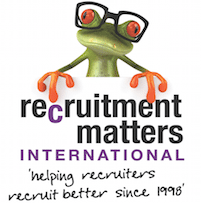Written by RMI’s MD, Ken Kemp.
Candidate scarcity is still the number one issue for recruiters, according to a recent report by Eploy. They surveyed over 600 recruiters (49% in-house, 51% agency) and the report highlighted the lack of suitably qualified candidates as a major concern for both agency (74%) and in-house (72%) recruiters.
They gave various reasons for this struggle including insufficient marketing budget, too low salaries for the role, etc.
However, I was prompted by the thought that perhaps they were being too traditional in their search criteria… After all, if you keep doing things the same way, don’t be surprised if you get the same (lack of) results.
Several other articles recently perhaps highlight this point and challenge traditional thinking:-
What about this recent initiative from Fujitsu?
Completely rethinking their view of what a desired recruit looks like has enabled Fujitsu to take on loyal, passionate apprentices that “blew the company’s socks off”, according to chairman Michael Keegan.
Keegan talked about how the firm’s traditional graduate recruitment methods had always delivered a certain type of apprentice.
Consequently, working with charity The Prince’s Trust, the firm learned to turn those methods on its head through a pilot known as the Get Into Programme. Along with two other companies, the aim was to find roles for 20 individuals with challenges, such as having a parent with addiction problems or poor school attendance due to the circumstances they found themselves in, Keegan explained.
“This is actually saying, forget everything you ever learned about hiring somebody, about what to look for,” Keegan said. “Go and look at people who have been completely excluded from the traditional hiring methodology that don’t tick any of the boxes.
“Working with this charity, we ran a programme to look at 20 or so young people from really excluded backgrounds and what we found was, over a two-week period, that they blew our socks off.
“Our HR department, having started off saying ‘Michael, what have you got us into?’, by the end of it they said: ‘You know we said we’ll try and find two people to hire? Well, we’ve seen these 20 people and we’ll hire six’.”
A year on, Keegan revealed all of the six are still with company.
Here’s another one for you..
US Military to review ‘unnecessarily restrictive’ recruitment standards
Recruitment, and standards within recruitment, is changing more rapidly in today’s world than in any other age.
And whilst recruiters should remind candidates that personal appearance does matter, perfection is not attainable.
The US Government is set to review the extremely-high standards for recruiting into the US Military, according to a report by Yahoo News.
The army could be relaxing their rigid recruitment processes by possibly welcoming single parents, overweight people, and even candidates who have smoked marijuana.
According to Pentagon Chief Ashton Carter, the US Government should not be alienating certain talent pools for relatively minor discrepancies.
He explains that recruiters face difficulties “with spectacular potential recruits, who nevertheless also reflect the times in relation to such benchmarks as their current physical fitness, tattoos they got when they were younger, and single parenthood.”
He went on to claim that the standards were “unnecessarily restrictive”, and promised to “assess the feasibility and impact of updated standards, such as those relating to body composition, physical fitness, swim tests, past marijuana use, single parents, and tattoos.
One final example to ponder..
Why hiring ex-offenders isn’t the risk you might think
Recruitment is one of the most challenging parts of growing a business, but hiring ex-offenders can be one way of attracting loyal and enthusiastic workers.
Over 17 per cent of the UK population between the ages of 18 and 52 have a criminal conviction, and they have found themselves with a largely negative reputation amongst hiring bosses. The odds are stacked against them, especially when conviction history remains one of the few areas where bosses can legally discriminate.
Given the number of people with criminal records though, it’s no longer an issue we can turn a blind eye to – there’s a pool of untapped people in prison who may have the skills you so desperately seek. And if we’re to close that productivity gap and keep a lid on mental health then it will mean employing more people than before i.e. those most bosses don’t like to talk about hiring.
Not only will you be raising your corporate responsibility in the eyes of the public, you’ll be making a huge difference to the economy – solving the mysterious link between employment rates and crime levels. In fact, champion Richard Branson claimed 70 per cent of those leaving prison re-offend within 12 months as they’re unable to find a job.
This was a figure he cited in a letter to the Financial Times. “Having a conviction is undoubtedly a major handicap for a job seeker, and UK companies are often reluctant to provide the second chance prison leavers need. From experience, people from prison, if properly selected, will prove to be just as reliable as recruits who come from elsewhere.
“It is their personality that matters most. With the prison population being 84,000 there is a large number of superstars who get ignored by bosses because of their record. It makes sense to recruit these individuals and to make use of their skills and enthusiasm.”
So, what do you think? Are we, all too often, fishing in the same pool, making ‘safe’ decisions about candidates – or the candidate profile? Come on, the candidate shortage challenge isn’t going to go away in a hurry, if ever. Perhaps it’s time to give a broader spectrum of people the opportunity to shine in the workplace.


